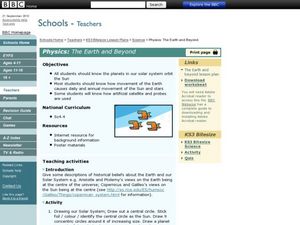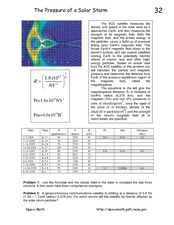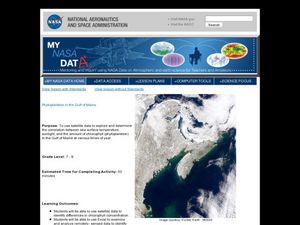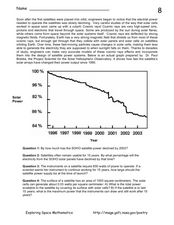Howard Hughes Medical Institute
Paleoclimate: A History of Change
Earth's climate changed drastically throughout the history of the planet, so why do scientists blame humans for recent changes? Observe data covering the history of the planet that proves the natural climate change patterns. Then, learn...
Curated OER
Understanding Climate Change
The young scientists in your class will appreciate a resource about different elements of climate change. The packet includes factual materials, informational text, and clear visuals, perfect for sharing with your environmental science...
Curated OER
Effects of the Sun on Our Planet (Grades 2-4)
Students observe how the sun's rays can cause evaporation and discuss its role in the weather cycle. They discover what the sun's energy brings to plants. They examine how different types of technology can enhance the amount of solar...
Curated OER
Physics The Earth and Beyond
Fourth graders will explore our solar system. In this physics instructional activity students create a model of the solar system to explore the movement of Earth, the Sun, and stars.
Curated OER
The Pressure of a Solar Storm
In this solar storm worksheet, students are given three equations and they calculate the magnetic pressure and the particle pressure of a solar storm. They also determine the distance to the magnetopause of the solar storm and determine...
Curated OER
Exploring Magnetism in Solar Flares
Students apply concepts of magnetism to help them understand the production of solar flares. In this solar flare lesson, students complete activities and graphic organizers to help them learn about magnetic fields on the surface of the...
Curated OER
Solar System: Let's Take a Trip
Third graders consider outer space. In this introductory solar system lesson, 3rd graders complete a KWL chart and listen to the story The Magic School Bus: Lost in the Solar System, by Joanna Cole & Bruce Degen. They will contribute...
Curated OER
Energy Conservation
Learners complete a variety of activities as they examine forms of energy, use of energy, different technologies to harness energy and the ethical implications of these sources and technologies.
Curated OER
Redesign the Rover: Mars Research Year-Round
Students discuss the solar system, the planets, periods of orbit and revolution. For this space lesson students discuss the importance of the study of Mars and brainstorm ideas on how NASA might solve its Rover design problem.
Curated OER
Gallery Walk Questions on Earth's Radiation Balance
Questions that can be used in a instructional activity on Earth's radiation balance are suggested in this resource. It is not a lesson plan, per se, but it is a list of questions for stations within a "Gallery Walk" instructional...
Curated OER
Clean, Green Power
Students explore and discuss alternative energy sources, and identify disadvantages of current fossil fuels.
Curated OER
It's Hot
Third graders examine the effect of sunlight on the earth. Individually, they pick an article of clothing out of a bag and sort themselves based on the color of the shirt and whether it should be worn on a cold or a hot day. To end the...
Curated OER
Investigation 3 - What is Moonlight?
Third graders observe a demonstration explaining that the moon reflects sunlight in ordr to shine.
Curated OER
A Cosmic Cafeteria
Students indentify and differentiate between transit and surface food systems. Students measure energy that is released by various foods. Students compare and contrast cooking with solar energy on earth and what they might have learned...
Curated OER
Is It Hot in the Light?
Third graders make observations about the temperature of items in direct sunlight. In groups, they discuss why asphalt, brick and cement are warmer than items surrounding them. To end the lesson, they examine how heat transfers energy...
National Wildlife Federation
Wherefore Art Thou, Albedo?
In the sixth lesson in a series of 21, scholars use NASA data to graph and interpret albedo seasonally and over the course of multiple years. This allows learners to compare albedo trends to changes in sea ice with connections to the...
Space Awareness
Oceans as a Heat Reservoir
Oceans absorb half of the carbon dioxide and 80 percent of the greenhouse gases released into the atmosphere. Scholars learn how and why the oceans store heat more effectively than land and how they help mitigate global warming. Pupils...
Curated OER
Phytoplankton in the Gulf of Maine
Students use satellite data to see the correlation between sea temperature and sunlight in the Gulf of Maine. In this phytoplankton lesson students use Excel to analyze data.
NOAA
Ocean Primary Production
A cold seep is an area on the ocean floor where hydrocarbons leak from the earth, creating entire unique biomes. Learners explore cold seeps, photosynthesis in the ocean, and its limitations due to loss of sunlight. They further explore...
Biology Junction
Water Biomes
Water covers more than 70 percent of Earth's surface. Scholars learn about both freshwater and saltwater biomes in a simple presentation. They compare and contrast the differences in oxygen levels, food sources, and sunlight to better...
Curated OER
GED Vocabulary: Earth and Space Science
For this earth and space science worksheet, high schoolers complete a crossword puzzle given nine terms related to earthquakes, glaciers, the solar system, and sources of energy.
Curated OER
Capturing the Sun's Warmth
Students explore the variety of ways to use solar energy. They investigate the thermal energy storage capacities of different test materials to determine which to use in passive solar building design. They explain how passive solar...
Curated OER
Cosmic Rays and Solar Cells
In this cosmic rays and solar cells worksheet, students read about how cosmic rays damage the electrical output of solar cells over time on satellites. Students use a graph of the solar power output compared to the year for the SOHO...
Curated OER
Seasons and Cloud Cover, Are They Related?
Students use NASA satellite data to see cloud cover over Africa. In this seasons lesson students access data and import it into Excel.

























